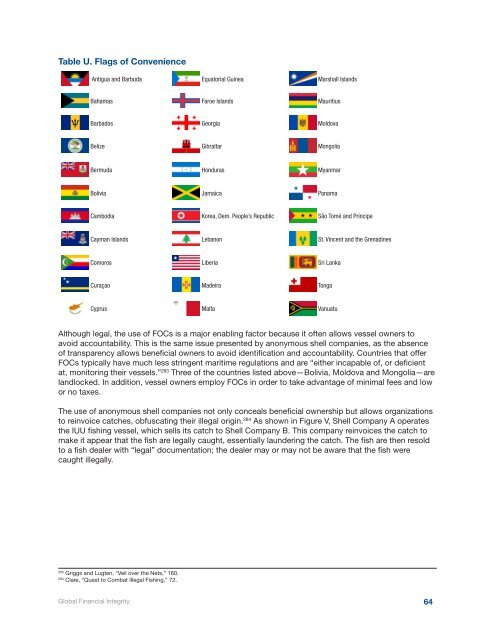Transnational Crime and the Developing World
Transnational_Crime-final
Transnational_Crime-final
You also want an ePaper? Increase the reach of your titles
YUMPU automatically turns print PDFs into web optimized ePapers that Google loves.
Table U. Flags of Convenience<br />
Antigua <strong>and</strong> Barbuda Equatorial Guinea Marshall Isl<strong>and</strong>s<br />
Bahamas Faroe Isl<strong>and</strong>s Mauritius<br />
Barbados Georgia Moldova<br />
Belize Gibraltar Mongolia<br />
Bermuda Honduras Myanmar<br />
Bolivia Jamaica Panama<br />
Cambodia Korea, Dem. People’s Republic São Tomé <strong>and</strong> Príncipe<br />
Cayman Isl<strong>and</strong>s Lebanon St. Vincent <strong>and</strong> <strong>the</strong> Grenadines<br />
Comoros Liberia Sri Lanka<br />
Curaçao Madeira Tonga<br />
Cyprus Malta Vanuatu<br />
Although legal, <strong>the</strong> use of FOCs is a major enabling factor because it often allows vessel owners to<br />
avoid accountability. This is <strong>the</strong> same issue presented by anonymous shell companies, as <strong>the</strong> absence<br />
of transparency allows beneficial owners to avoid identification <strong>and</strong> accountability. Countries that offer<br />
FOCs typically have much less stringent maritime regulations <strong>and</strong> are “ei<strong>the</strong>r incapable of, or deficient<br />
at, monitoring <strong>the</strong>ir vessels.” 283 Three of <strong>the</strong> countries listed above—Bolivia, Moldova <strong>and</strong> Mongolia—are<br />
l<strong>and</strong>locked. In addition, vessel owners employ FOCs in order to take advantage of minimal fees <strong>and</strong> low<br />
or no taxes.<br />
The use of anonymous shell companies not only conceals beneficial ownership but allows organizations<br />
to reinvoice catches, obfuscating <strong>the</strong>ir illegal origin. 284 As shown in Figure V, Shell Company A operates<br />
<strong>the</strong> IUU fishing vessel, which sells its catch to Shell Company B. This company reinvoices <strong>the</strong> catch to<br />
make it appear that <strong>the</strong> fish are legally caught, essentially laundering <strong>the</strong> catch. The fish are <strong>the</strong>n resold<br />
to a fish dealer with “legal” documentation; <strong>the</strong> dealer may or may not be aware that <strong>the</strong> fish were<br />
caught illegally.<br />
283<br />
Griggs <strong>and</strong> Lugten, “Veil over <strong>the</strong> Nets,” 160.<br />
284<br />
Clare, “Quest to Combat Illegal Fishing,” 72.<br />
Global Financial Integrity<br />
64


